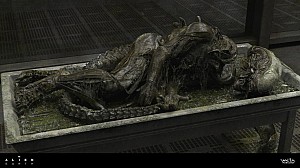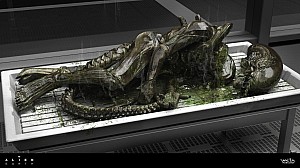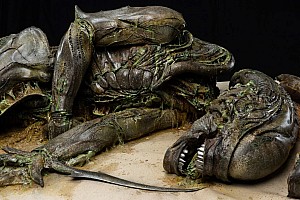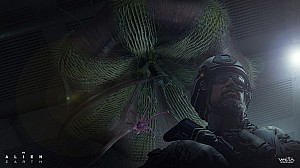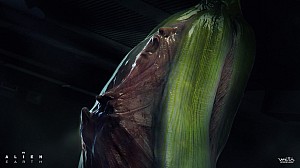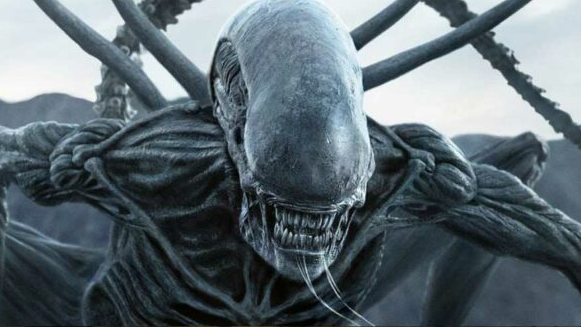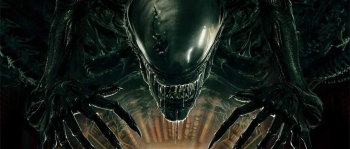Here's my breakdown of why Prometheus might become as classic as Alien
Prometheus Forum Topic
kinslayer
MemberOvomorphJun 17, 20122029 Views20 RepliesOr at least why I think a lot of people are criticizing Prometheus for the same things that Alien was criticized at first. I'm posting this here and not in the Alien section because it concerns Prometheus more than it does Alien.
So I had to go and see Alien once again with a different set of eyes and to try to spot stuff that people back then might've taken the wrong way pretty much like people right now are doing so with Prometheus.
And I discovered a lot to be honest.
So imagine that it's 1979 and we're asking some questions for the first time.
First of all, Alien, pretty much like Prometheus, leaves a lot to speculation. Not as much but a lot.
[b]One example[/b] is the emergency destruction unit. It never gets properly explained why for fuck's sake you'd have the option to blow up your own ship with a specifically designed (for that purpose) destruction unit. The way I see it no one's stopping anyone from pointing that out as entirely convenient or blaming the movie that we NEED TO make the assumption that Weyland Yutani (about which we know nothing at this point) is the kind of company that would design a special emergency destruction unit just in case that one would need to destroy the ship if there's a possibility of leak of classified info or in case of the Nostromo being hijacked by a competitor (space pirates????). Or like this offered explanation says:
[quote]Or, a 20 million ton ship flying
through space at very high speed tends to become a great danger when
it gets off course by some malfunctions. If it's on collision course
to some space station or colony, and there is no possibility of
redirecting or stopping it, it would be very reasonable to put it on
self-destruct and get away with the small shuttle.
[/quote]
So we need to make that assumption in order to explain that element.
[b]Another example.[/b] Everyone's dead. Ripley runs through the whole ship trying to set the charge properly and prepare the shuttle. The Alien's nowhere to be seen for like 15 minutes (which is supposed to build suspense and make its appearance in the shuttle more surprising). Ripley escapes with the shuttle, takes her clothes off, we see the alien and it's.... sleeping?... Like uhm... why? Some say it's hurt. Others say it's hibernating because it's at the end of its life-cycle. Again, assumptions we have to make and, again, no one's stopping anyone from saying 'duuhhhhhh what a stupid alien' or complain about how diminished it is now by the developments (no one but 30 years of praise for Alien as one of the best sci fi).
[b]Another example.[/b] Forget the acid blood and whether that's possible. How do these aliens grow up so fast while not/never ever eating anything? Pushing all the sequels aside (and not even they answer this) all we can assume is that, while the baby xeno is still forming inside the host it sucks enough nutrition out of the host (nutrition, not flesh or blood or anything) for its entire lifespan, which Alien might be suggesting to be pretty short if the xeno at the end was dying anyway. So that's another assumption we have to make, which doesn't even explain everything. In fact, we need to make the assumption that the Alien having acidic blood is possible pretty much in the way humans have that special liquid in their stomachs that prevents stomach acid from corroding our insides. Still, the best thing that would explain almost everything about Alien 1979 started becoming apparent only after Resurrection and AVP ( [url=http://www.youtube.com/watch?v=5dzj4tMKsOM]Your text to link here...[/url] ). It required a viewing of Resurrection to really understand how obvious it is for the xenos to be some kind of a bioweapon. In Alien it wasn't obvious at all. It was just another assumption we had to make if we wanted to make a better sense out of all this. We had to, indirectly, reach the implication of how acidic blood, killer instincts, amazingly fast growth rate and no need for food or anything other than a host are all in no way coincidential and can in no way be 'god's creation or design'. This is in a way saying that there was a "plot hole" in Alien (which was the Alien itself) that got filled and developed with time. Even if there were no sequels, the bioweapon thing would've been just another assumption that would be needed to make sense out of the xeno.
[b]Another example(s):[/b] They have an emergency destruction unit as previously stated, but they don't have guns? And they don't have guns but they have flamethrowers? Flamethrowers in space? Also, the word 'weapons' is mentioned three times in the script, don't know how many times in the movie. The first time it's used is right before they get out of the Nostromo and head towards the juggernaut. These 'weapons' are not shown or explained. Nor are they explained. Nor is their absence. In fact I ctrl+F the word 'shoot' in the script and it's used twice and not even once in relation to a gun which means they don't say in the movie that they shouldn't use their guns (which we don't see anyway) just because the acid can burn a hole into the ship (which is big as fuck anyway and we already saw the acid only burning 3 deck-floors down before stopping). I'd take my chances with a gun instead of a flamethrower.
[b]Another example:[/b] Random things such as Ripley's nose-bleed. Some say it's supposed to be for effect in comparison with Ash's white android sweat drops, implying malfunction. Even then, why? A random nose-bleed goes unexplained, it breaks character and demands further speculation. After that, why did Ash decide to kill her? Was it because of malfunction? Why did he malfunction? If it wasn't a malfunction then I guess he was designed to get rid of the crew if someone found out that Yutani wanted the alien life form delivered. However, we already saw him calculate chances precisely. Wouldn't that imply that a smart android like that wouldn't just reduce his own chances by going straight out on a murderous spree on Ripley? At least not imedeately/directly. Wouldn't it be smarter for a con-artist like that to try and convince the crew, at least in a way of baiting them and then getting rid of them all at once? Also, why suffocate Ripley with a magazine? Was it sexual, because of the Playboy cutouts hangin around? Were those his cutouts? Ridley jokes about this in the commentary saying “I guess this is the closest you’ll get to seeing a robot have sex.” (funny having Blade Runner in mind). So should we assume he was somehow jealous because even if he could have sex he wouldn't experience what human beings can? What should we assume?
[b]Another example:[/b] Unconventional character development. By the time Kane gets facehugged we know as much about him as we do about anyone in the crew (we probably know most about Ash and Dallas till that point, given how they both are so 'obedient' when it comes to company protocol and rules, Kane also is, as he insists going into the juggernaut upon discovering it). After Kane gets facehugged we find out that Ripley prefers being completely strict to quarantine measures (while Ash, the science officers, suspiciously isn't). Still, the first character to cross the 'first threshold' of the so called 'hero's journey' formula is Kane and yet, neither by the moment of facehugging nor after that do we find out anything important about him. He's the most expendable character there, along with the girl who cries a lot. In fact, he seems to be worth way more dead than alive (which is actually the brilliant thing about it, and yet, it can be misunderstood). It's puzzling that you've got all these characters worrying about a character that you'll never get to know. It's only after he gets facehugged that that brings the most of everyone else. You could say that the character needed to lack story or features or purpose (other than to be facehugged) so that when he died you wouldn't feel much of a loss and concentrate on the horror-effect that event had on everyone else. On the other hand you could say that that effect could've been way stronger if that character had better development. From that point on anything anyone says about how Alien had great character development you should take with a grain of salt, because there's apparent flaws/holes in it, which through speculation can be taken in any given way.
[b]Another example:[/b] This scene [url=http://www.youtube.com/watch?v=KzRXrPl-OoA]Your text to link here...[/url] Faulty editing combined with possible complications during filming combined with a somewhat pointless character. Yes, it had that. One could argue that the crying girl character (Lambert) is completely pointless. Let's forget about the fact how there was a rape scene between Lambert and the Alien implied in the movie (it was also implied by Ridley and by an article called "I was raped by an Alien" written by the actress that played Lambert). Let's get back to the scene where Lambert is cornered by the alien which makes Parker unable to use fire on the xeno. He gives up and (in the most weird and hilarious way actually) throws himself on the xeno, which ends up in both of them being ripped apart by the xeno. The sequence was actually kinda frustrating in filmmaking terms. The shots were cut awkwardly, the editing kinda broke the viewers ability to follow the chronology of events, not to mention that there was a slight numbing of sound that felt out of place. All followed by a shot of the xeno's tail going from under and between Parker's legs, going up towards his back/butt. That shot was later added on Lambert's side with the intention of creating ambiguity about whether she was actually raped by the alien (but Lambert had cowboy shoes so those weren't her feet). So, in the end, you had a good written and not pointless character have to sacrifice himself for a somewhat pointless (at least she felt that way) character which ended up in the death of both of them. That's a reason for a lot of frustration right there.
All this is to prove how most people have probably forgotten that Alien always has been about filling (not to call em plot-holes) the lack of explanation with speculation. Even 30 years ago the viewer still had to do a lot of gap-filling even for something that's supposed to be even more straightforward than Prometheus. Both movies weren't about just questioning everything but questioning it and finding the right and possibly optimal explanation for a certain moment or element. You can't and shouldn't praise one and hate on the other. They're both made of the somewhat-same approach, the same passion and specialize in the somewhat-same kind of magic. The things I just pointed out about Alien aren't even everything that can be said about it. It just proves that not everything in Prometheus is supposed to be obvious, that not everything is supposed to make sense at the outset and that that's exactly what's special and good about it and also what created the underground fanbase for Alien. Parading over how much people 'impose' onto Prometheus is a criticism towards Alien as well.
Are you an avid Alien fan looking for a dedicated online community of likeminded fans? Look no further! Create your own profile today and take part in our forums and gain XP points for all the content you post!









